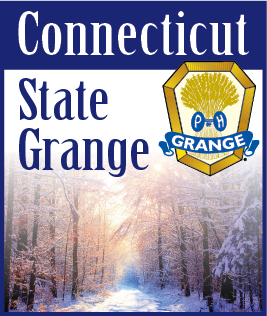| MAY 2, 2010 -- Seeking to improve the relationship between the North and South following the Civil War, a group of farmers just outside Washington, D.C., established the first Grange organization in 1867 as way to trade commodities and build better families.
Although the purpose of the group has changed since its founding, the strong connection to communities has remained a vital part to the mission.
In Connecticut, there are 60 Granges still in existence today. Residents in Manchester established Grange No. 31 in 1885, and the organization is celebrating its 125 anniversary with an open house on Wednesday, May 5, at 7:30 p.m. at Zion Lutheran Church.
In the 1880s, Manchester was a leader in silk-making, forestry, and other agriculture-based products.
On May 19, 1885, Manchester resident and farmer James B. Olcott gathered a group of 27 residents at the District 6 Schoolhouse to promote agricultural initiatives in the community. Working as co-ops, granges began to pop up across the state and country as a way for farmers to trade products at better prices and work together in reducing shipping costs for their goods.
From the beginning, granges openly-accepted women as equal members and leaders within the group.
According to Edith Schoell, secretary of both the state's and Manchester's Grange and a member of the Manchester Grange for over 60 years, the granges were a way for residents to improve themselves as better family and community members.
Schoell, a life-long resident of Manchester whose parents were Grange members when she joined as a young child, felt it was a good thing to become a part of since she was so shy.
"Once you get in the Grange, you don't stay shy too long. It's a lot of good training for any young person," Schoell said, referring to members speaking before the group.
Granges were also important in bringing mail service to rural communities with the establishment of rural free delivery service.
The group was also influential in promoting a Manchester agricultural fair, where Schoell recalls entering her crafts and the flowers she grew as a young girl.
Beginning in the 1980s with the shift away from an agriculture-based economy, many granges have changed their focus to a more civic approach by getting involved with various community projects.
In recent years, the Manchester Grange has held fundraisers, oyster dinners, pancake breakfasts, and barbecues to support a local food pantry, the Goodwill store, the humane society, and area schools. The group also is active in Heritage Days held at Cheney Hall.
The group is participating in a national Grange push called "words for thirds" to help bring dictionaries to third-graders. The group gave dictionaries most recently to students at Washington School and Nathan Hale Elementary School.
There are 42 members in the Manchester Grange, says Schoell, with most members 50 and older. The group invites new members of any age. According to Schoell, only one of Manchester's members is a farmer.
IIn the 1880s, Olcott, Manchester Grange's founder, was appointed to a committee to report on an offer of land and money from Augustus and Charles Storrs to build an agricultural school in Storrs. The committee approved the project and in 1881 the Storrs Agricultural School (now the University of Connecticut) was established. Olcott was appointed as a member of the school's first board of trustees.
Olcott used his home as a meeting place for the Grange to gather until it began to meet regularly at South Methodist Church Vestry in 1886. The group now meets monthly at Zion Lutheran Church on Cooper Street.
During the organization's first anniversary, Olcott is recorded to have brought his personal collection of 42 different grasses to display during a community gathering at the Town Hall.
For Schoell, the Grange has become a family unit, a place to make friends and to have a good exchange of ideas. But to keep the connection to the agricultural past, the Grange tries to promote backyard gardens and local farmers markets.
"Local farmers are hurting. We try and support the farmers when they open the farmers markets," Schoell said "Their produce is much fresher than what you can get in the stores."
The group has also written letters of concern to government leaders advocating their support for farming communities.
During the open house, the group will present a history of the Manchester Grange, including a presentation of service awards to members.
|
